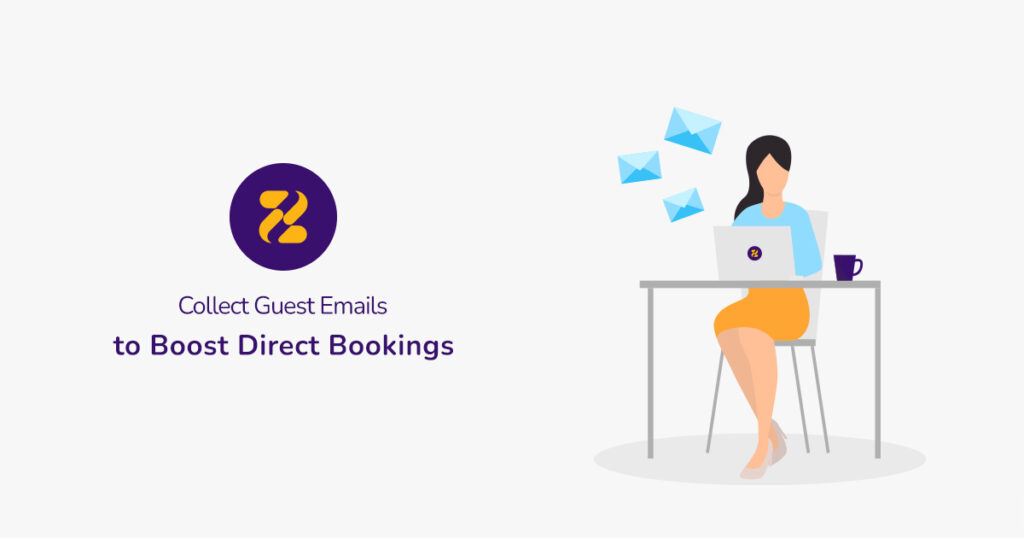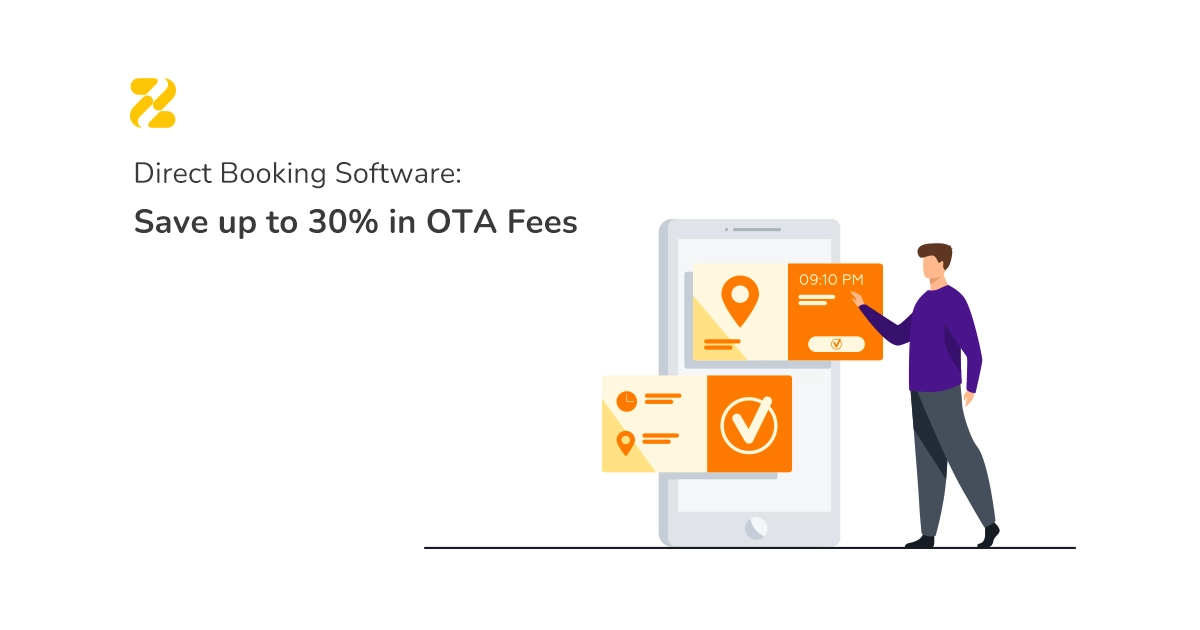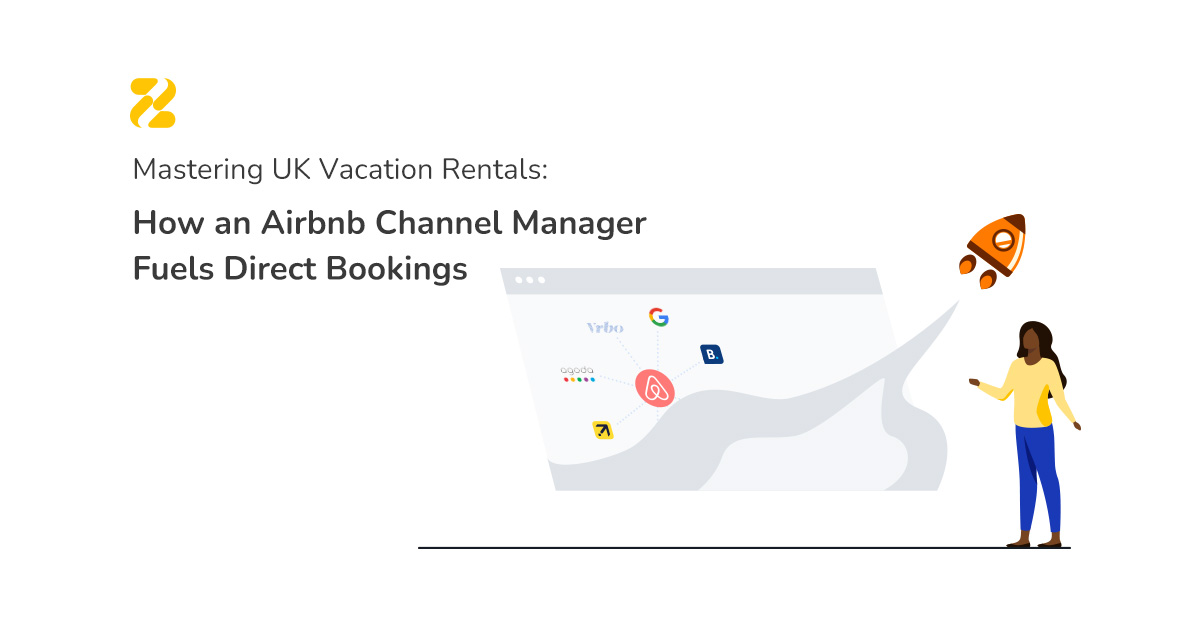Table of Contents
Why Collect Guest Email Addresses?
Are you relying solely on third-party booking platforms like Airbnb or Booking.com to manage guest communications? While it seems convenient, you’re missing a key element – direct contact with your guests.
To protect guest privacy, Airbnb and Booking.com use forwarding email addresses for initial communication.
This prevents guests from receiving unwanted emails. However, it might make it challenging for vacation rental managers to build direct relationships with their guests.
This data has power. You should know that if the booking site keeps your guests’ contact details to themselves, they’re effectively not your guests.
Most OTAs (Online Travel Agencies) often mask guest contact information and leave you dependent on them for repeat bookings. But, you should not give this up – collect data yourself. By collecting your guests’ real email addresses, you can:
- Build a valuable marketing list
- Increase direct bookings (saving on OTA fees)
- Engage guests with personalised offers
Ready to take control of your guest communications? Let’s dive into how you can start collecting those valuable email addresses.
Strategies for Building Your Marketing List

Now that you are aware of having an email marketing tool value and understand the power of collecting email addresses, it’s crucial to develop a targeted marketing strategy for your existing customers. Building an email list not only strengthens your connection with current clients but also positions you to engage potential customers in the future and increase your conversion rates.
By creating personalised email marketing campaigns, you can nurture your relationships, drive repeat business, and design strategies tailored to your audience’s needs. Proactive planning allows you to stay ahead, ensuring your campaigns are ready to convert potential leads into loyal customers.
Here is how to do it:
1. The Personal Touch
If you meet guests in person for check-in, this is your chance! Make it conversational:
- Ask where they’re from or what brings them to town.
- Casually request their email, explaining the perks like future discounts and personalised offers.
Tip: Make it feel natural. If you use self-check-ins, this strategy won’t be applicable.
2. Pre-Arrival Contact
Reach out to guests before their arrival. Send a polite email or message thanking them for their booking and ask for their direct email address. Frame it as a way to provide a smoother check-in process or to offer exclusive promotions for future stays.
3. Automated Emails
Manual email collection can be time-consuming. Consider using tools like Google Forms or CRM systems like HubSpot.
Send these forms with your booking confirmation emails to streamline the process. Want to simplify even further? Let’s automate it.
Automating Guest Email Collection

If manual collection sounds cumbersome, automating the process is the answer. Zeevou’s Online Check-In Process does this for you efficiently:
- Auto-collects guest emails directly through the check-in form.
- Detects hidden emails from OTAs like Airbnb and Booking.com.
- Ensures compliance with GDPR, allowing guests to opt-in for future marketing.
Zeevou helps you maximise direct bookings by providing tools for guest follow-ups and targeted email marketing.
It streamlines guest communication by automating follow-up emails and personalised messages. Zeevou prioritises data privacy and GDPR compliance by securely storing guest emails and obtaining consent for marketing purposes. This allows you to build stronger relationships with your guests and drive repeat bookings.
Best Practices for Guest Email Collection
best practices for ethically collecting guest emails:
- Transparency: Clearly inform guests why you’re collecting their email and how it will benefit them (e.g., exclusive offers, discounts).
- Obtaining consent: Always get explicit consent from guests to receive marketing emails to comply with laws like GDPR.
- Providing value: Ensure your email campaigns provide real value to guests—whether through personalized offers, local travel tips, or property updates—so they stay engaged.
Unsubscribe option: Always provide a clear and easy way for guests to unsubscribe from your emails to maintain trust and compliance.
Creating Effective Email Campaigns
To maximise the impact of your email marketing campaigns, it’s essential to follow a few best practices:
- First, segment your email list based on guest behaviour, stay history, or preferences. For example, you can create separate segments for repeat guests, first-time visitors, or those who stayed for special occasions.
This segmentation enables you to send more personalised, relevant messages, which can lead to higher engagement and conversion rates.
- Next, personalise your content by using the data you’ve gathered. Address guests by name and reference their past stays or preferences. For instance, if a guest previously booked a seaside property, consider offering them discounts on similar properties or inviting them back with a personalised “We missed you” email.
Personalisation helps create a stronger connection with your guests and can significantly improve your open and click-through rates.
- When designing your emails, ensure they are visually appealing with clear calls to action (CTAs). Use bold, eye-catching buttons that make it easy for recipients to take action, such as “Book Now” or “Claim Your Offer.” Keep the layout clean and responsive, ensuring it looks good on both desktop and mobile devices.
- Finally, A/B testing is crucial to understanding what resonates with your audience. Test different subject lines, email designs, or CTAs to see which versions result in higher engagement.
This data-driven approach helps you fine-tune your strategy and maximise the effectiveness of your campaigns.
By segmenting, personalising, designing effectively, and testing, you can create email campaigns that are more likely to convert and build stronger relationships with your guests.
Conclusion
Collecting guest email addresses is a critical step in gaining independence from OTAs. By doing so, you build long-term relationships and increase your revenue through direct bookings. Manually or through automation tools like Zeevou, collecting guest emails is crucial for your vacation rental business’s growth. Want to learn more about automating guest communication and booking management? Request a Free Demo from Zeevou today.




